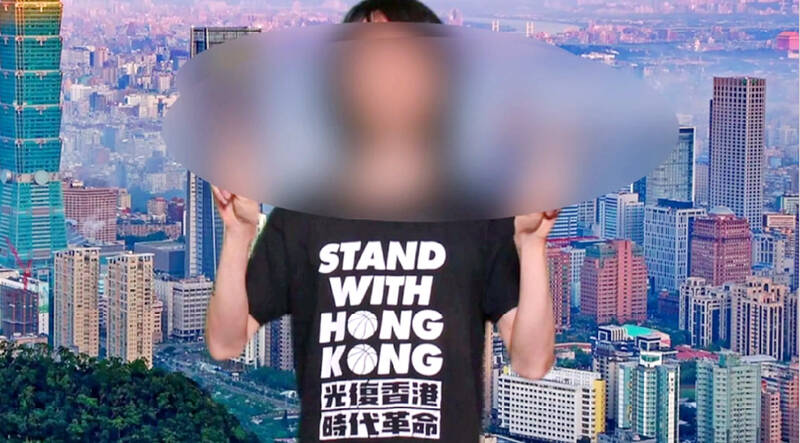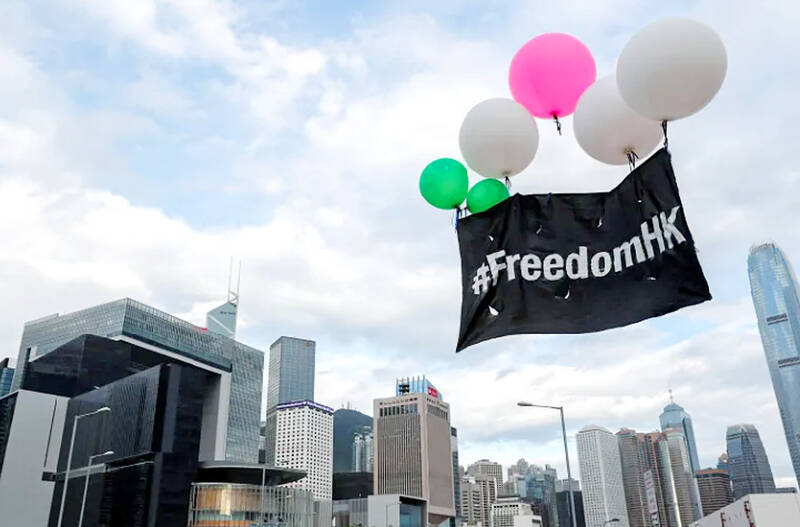A 27-year-old man faces up to several years in jail for sedition, after pleading guilty to wearing a protest T-shirt that prosecutors say flouts Hong Kong’s new national security law.
Chu Kai-pong (諸啟邦) had already served a three-month prison term for sedition in January for wearing and keeping in his luggage clothes and flags with protest slogans.
Yesterday, he pleaded guilty to one count of “doing acts with seditious intent,” leading to the territory’s first conviction under the new tougher law.

File photo: grab from FB
One of the slogans on the T-shirt, “Liberate Hong Kong, revolution of our times,” had been found to be “capable of inciting secession” in a separate court case.
Chu was arrested for wearing a T-shirt with the offending slogan and a yellow mask printed with “FDNOL” — the shorthand of another slogan “five demands, not one less” — on June 12 — a date associated with the huge and sometimes violent democracy protests in 2019.
Chu told police he believed the slogan called for the return of Hong Kong to British rule, the court heard, and he chose the outfit to remind the public of the 2019 protests when the phrase was widely used by pro-democracy demonstrators.

Photo: Reuters
Convicting Chu following his guilty plea, chief magistrate Victor So (蘇惠德) added that two other offenses of failing to produce an ID card and loitering were dropped.
Chu, who has been in custody for three months, is to be sentenced on Thursday.
Hong Kong enacted a tougher national security law in March, the second legislation of its kind following the one imposed by Beijing in the middle of 2020 afterb quashing the protests.
The revised law beefed up the offense of sedition — a colonial-era offense — to include inciting hatred of China’s communist leadership and upped its maximum jail sentence from two years to seven.
It also punishes five categories of crimes: treason, insurrection, sabotage, espionage and external interference.
Chu’s lawyer argued that the maximum he could be given would be two years. Sedition was created under British colonial rule, which ended in 1997, and was seldom used until Hong Kong authorities revived it in 2020 and charged more than 50 people and four companies.
Critics, including Western nations such as the US, say the new security law would further erode freedoms and silence dissent in Hong Kong.
However, authorities defended the law as necessary to fulfill a “constitutional responsibility,” comparing it to a “reliable lock to prevent someone from breaking into [our] home.”
As of last month, 301 people had been arrested under the two security laws, with 176 prosecuted and 157 convicted.
Additional reporting by Reuters

CHAOS: Iranians took to the streets playing celebratory music after reports of Khamenei’s death on Saturday, while mourners also gathered in Tehran yesterday Iranian Supreme Leader Ayatollah Ali Khamenei was killed in a major attack on Iran launched by Israel and the US, throwing the future of the Islamic republic into doubt and raising the risk of regional instability. Iranian state television and the state-run IRNA news agency announced the 86-year-old’s death early yesterday. US President Donald Trump said it gave Iranians their “greatest chance” to “take back” their country. The announcements came after a joint US and Israeli aerial bombardment that targeted Iranian military and governmental sites. Trump said the “heavy and pinpoint bombing” would continue through the week or as long

TRUST: The KMT said it respected the US’ timing and considerations, and hoped it would continue to honor its commitments to helping Taiwan bolster its defenses and deterrence US President Donald Trump is delaying a multibillion-dollar arms sale to Taiwan to ensure his visit to Beijing is successful, a New York Times report said. The weapons sales package has stalled in the US Department of State, the report said, citing US officials it did not identify. The White House has told agencies not to push forward ahead of Trump’s meeting with Chinese President Xi Jinping (習近平), it said. The two last month held a phone call to discuss trade and geopolitical flashpoints ahead of the summit. Xi raised the Taiwan issue and urged the US to handle arms sales to

BIG SPENDERS: Foreign investors bought the most Taiwan equities since 2005, signaling confidence that an AI boom would continue to benefit chipmakers Taiwan Semiconductor Manufacturing Co’s (TSMC, 台積電) market capitalization swelled to US$2 trillion for the first time following a 4.25 percent rally in its American depositary receipts (ADR) overnight, putting the world’s biggest contract chipmaker sixth on the list of the world’s biggest companies by market capitalization, just behind Amazon.com Inc. The site CompaniesMarketcap.com ranked TSMC ahead of Saudi Aramco and Meta Platforms Inc. The Taiwanese company’s ADRs on Tuesday surged to US$385.75 on the New York Stock Exchange, as strong demand for artificial intelligence (AI) applications led to chip supply constraints and boost revenue growth to record-breaking levels. Each TSMC ADR represents

State-run CPC Corp, Taiwan (CPC, 台灣中油) yesterday said that it had confirmed on Saturday night with its liquefied natural gas (LNG) and crude oil suppliers that shipments are proceeding as scheduled and that domestic supplies remain unaffected. The CPC yesterday announced the gasoline and diesel prices will rise by NT$0.2 and NT$0.4 per liter, respectively, starting Monday, citing Middle East tensions and blizzards in the eastern United States. CPC also iterated it has been reducing the proportion of crude oil imports from the Middle East and diversifying its supply sources in the past few years in response to geopolitical risks, expanding